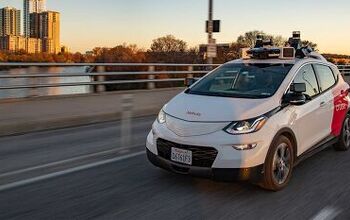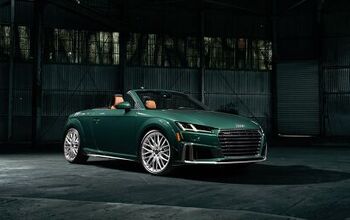QOTD: Last Stand of the Great Eight?

Last year’s debut of a wonderfully throwback engine was just the early Christmas present many traditional truck fans needed. Sporting an iron block, pushrods, and 7.3 liters of displacement, Ford’s new heavy duty V8 felt like the 1970s were still upon us.
Rumor has it Mathew Guy has a blueprint of one adorning his bedroom ceiling.
While a delightful addition to the world of all things American and big, the engine carrying the codename Godzilla leads us to ponder how long it can all last.
Yesterday we received the latest hint that Toyota’s revamped Tundra, apparently due next year, will carry no V8 engine. A six-cylinder, with the assistance of turbochargers and an electric motor, will muster the needed oomph.
At least in full-size guise, Ford’s been headed towards that destination for years — the F-150’s V8 take rate declined steadily following the release of the 3.5- and 2.7-liter Ecoboosts. A hybrid and fully electric variant are on the way. It’s not hard to guess which member of the Detroit Three will be first to leave V8s behind. Over at General Motors, the Chevrolet Silverado offers a turbo four-cylinder on a range of trims. Good idea or not, the move showed that mindsets are changing in the full-size truck segment.
The orthodoxy that ruled the pickup field for decades is shifting, all thanks to environmental considerations. Thus far, the only major player not talking about electrics is Fiat Chrysler, purveyor of two Ram 1500s. Surely that will change. As a shifting product mix spurs the need to boost fuel economy in big vehicles, the automaker’s engine range could one day contain no trace of the word “Hemi.”
As for Nissan, one wonders how long the Titan nameplate will last, never mind the engine (which happens to be a standard V8).
Take your best guess, B&B — which automaker will be the last to offer a V8 engine in its full-size pickup lineup? We’ll keep heavy duty trucks off the table for now.
[Image: Ford, Fiat Chrysler]

More by Steph Willems
Latest Car Reviews
Read moreLatest Product Reviews
Read moreRecent Comments
- Jkross22 Sure, but it depends on the price. All EVs cost too much and I'm talking about all costs. Depreciation, lack of public/available/reliable charging, concerns about repairability (H/K). Look at the battering the Mercedes and Ford EV's are taking on depreciation. As another site mentioned in the last few days, cars aren't supposed to depreciate by 40-50% in a year or 2.
- Jkross22 Ford already has an affordable EV. 2 year old Mach-E's are extraordinarily affordable.
- Lou_BC How does the lower case "armada" differ from the upper case "Armada"?
- TMA1 Question no one asked: "What anonymous blob with ugly wheels will the Chinese market like?"BMW designers: "Here's your new 4-series."see also: Lincoln Nautilus
- Ivor Honda with Toyota engine and powertrain would be the perfect choice..we need to dump the turbos n cut. 😀



































Comments
Join the conversation
I don't recall consumers bugging automakers to lop off cylinders instead of proven engines and replace lost power with complexity, high pressures/temps and hopefully a short duration of teething problems for the sake of marginally improved real world economy. They're compliance engines, compliance transmissions, compliance all over. I'm fine with it, but clearly leasing is the way to go.
Wrong thread